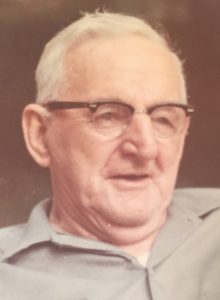Donna and I had only been married about six weeks and we had no phone, so the message was delivered on foot that evening by her little brother, Eddie: My Dad’s plant had burned.
Truth be told, in the summer of 1963 Dad didn’t have much of a business left. Or life, for that matter.
His “plant” was in a rented building on Smith Street in Charlotte where his employees assembled wardrobe boxes and manufactured and packaged pot holder looms and loops, and Tiger Teeth, a wire with sharp ends, used to hold insulation in place. Now that was all gone. There was no insurance to collect and, except for a few steel rods, nothing to salvage.

John F. Stith Sr. was in a tough spot:
He was old. At least by the standards of that day. He had turned 68 in May.
He was sick. He had emphysema so bad I thought he might die 18 months earlier when I was overseas, in the Navy, and I wouldn’t get to go to his funeral.
He was broke. He had borrowed money to give us a wedding present, I learned later. He and Mother still lived in a two-bedroom house on Leigh Avenue in North Charlotte, then a working class section of town, the house he bought after he had lost everything he owned in Alabama and moved his family to North Carolina ten years earlier.
I knew there wasn’t much I could do other than show up but I took off work the next day anyway. I was a rising sophomore at the University of North Carolina at Chapel Hill but Donna and I were living and working in Charlotte that summer. She was a stenographer for the FBI; I was a reporter for The Charlotte News.
I needed to be there for him but I also needed to be there for myself, just in case.
Until I turned 18 and went to boot camp, and then to sea, my father had dominated my life. He had been the undisputed Lord and Master of his house and seven children. When he told you to do something, you had better listen up: he only told you once.
Now he was old, sick, broke, and burned out. I didn’t want him to sit down on the curb and cry, but if he did, if he came unglued, I wanted to see it. It would have been like watching a mountain slide into the sea.
But he did not sit down and cry. On the contrary. That may have been the finest hour of his life. He strutted around, barking orders, acting like the fire was gift that allowed him to demonstrate his manliness. He looked happy: Finally! A problem worthy of me.
He told me he would be back in business the next day and he was. He rented a warehouse in North Charlotte that was infested with rats the size of small cats, that flooded every time it rained hard and the creek rose, but he was back in business.
After the fire Dad reinvented himself and made a ton of money, enough to buy a new house in a good neighborhood, enough to enable my Mother to go back to Alabama after his death and retire in comfort.
My father became a rag man, buying tons of remnants from textile mills and reselling them. He bought cloth for 10 cents a pound and sold it, some of it, for $2 a pound. You can get well that way, selling stuff for up to 20 times what you paid for it.
Coming Friday: Misadventures